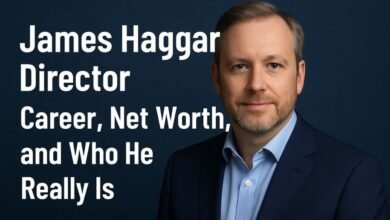James Feen: The Unseen Architect of Sustainable Change in 21st Century Britain

In an era defined by rapid transformation—climate volatility, technological disruption, and political fragmentation—quiet figures often drive the most lasting changes. Among them stands James Feen, a British environmental strategist, policy advisor, and community sustainability advocate whose behind-the-scenes influence is beginning to command attention across the UK and beyond.
With a career spanning academia, civil service, and grassroots activism, James Feen exemplifies a new generation of changemakers: data-driven yet people-focused, visionary yet grounded in local realities.
This profile explores his journey—from early academic passions and policy development to the quiet revolutions he’s helped steer in environmental planning, civic governance, and community-led design.
Early Life and Education: Curiosity Born from Contradiction
Born in Yorkshire in 1976, James Feen grew up between two worlds. His father worked in industrial engineering while his mother was a librarian and part-time community organizer. The juxtaposition of mechanical precision and human-centered advocacy shaped young James’ outlook early on. He quickly became fascinated by how systems—both technological and social—could either enable or undermine collective well-being.
James attended a local grammar school before earning a place at Durham University, where he studied Environmental Geography. His undergraduate thesis focused on “Ecological Zoning and Urban Growth in Post-Thatcher Britain,” a prescient topic that would foreshadow his future work.
Not content with academic abstraction, he pursued a Master’s in Public Policy and Planning at the London School of Economics (LSE). There, he developed expertise in urban systems, green infrastructure, and sustainable governance.
Early Career: From Policy Advisor to Systems Thinker
Feen began his professional life in the UK Civil Service, working under the Department for Environment, Food & Rural Affairs (DEFRA). As a junior analyst, he contributed to national consultations on waste policy and green energy subsidies.
What set James apart was his ability to translate data into human narratives—charts into stories, maps into actionable community steps. His work gained attention, and by 2010, he was leading sustainability initiatives that bridged local governments and central regulatory bodies.
During this time, he co-authored “Planning for the Commons: Integrating People into Policy,” a white paper that received cross-party interest. It challenged top-down environmental planning and instead called for participatory models that involved community stakeholders from the outset.
Pioneering Work in Urban Sustainability
Between 2012 and 2019, James Feen shifted into the nonprofit sector, taking a leadership role at the Urban Renewal and Ecological Design Initiative (URED)—a think tank based in Manchester. His vision: to transform Britain’s aging infrastructure into living, adaptive systems that worked for both people and the planet.
Major Projects Included:
- Rewilding Grey Zones: Turning abandoned industrial estates into urban meadows, carbon sinks, and public parks.
- Circular Economy Models: Assisting local councils in repurposing waste materials in housing renovations.
- Green Roof Legislation: Advising on policies that led to pilot programs requiring all new council buildings to include biodiversity-supporting roofs.
His efforts contributed to the Greater Manchester Green Accord (2016), a multi-stakeholder pact that created the groundwork for the city’s current sustainability success story.
A Thought Leader Rooted in Community
While many in his field climb the media ladder, James Feen has taken the opposite approach—intentionally staying out of the spotlight to focus on systems-level impact. Nevertheless, his work has been published in respected journals such as Sustainable Cities and Society and The British Journal of Urban Planning.
Beyond publishing, Feen has become a mentor to dozens of young urbanists, working as a visiting lecturer at institutions like University College London (UCL) and Sheffield Hallam. His lectures often revolve around systems thinking, regenerative design, and ethical frameworks in public planning.
He has also maintained hands-on involvement in community projects, from coordinating allotment gardens in Sheffield to co-designing flood-resilient homes in Kendal.
Quiet Influence on British Policy
In recent years, James has served as an independent consultant to parliamentary committees on issues ranging from green transport corridors to post-Brexit land use reform.
While he avoids party affiliation, his balanced, deeply researched insights have made him a valued voice across the aisle. In 2022, his internal report on “Nature-First Infrastructure” was cited in debates concerning the UK’s Environment Act.
Perhaps his most underrated contribution has been behind closed doors—retraining policymakers to see climate solutions not as burdens, but as long-term public investments.
Personal Philosophy: Sustainability as Interdependence
When asked what sustainability means to him, Feen doesn’t default to buzzwords. Instead, he speaks of interdependence—how no change exists in isolation, and how ecological repair must include social renewal.
He argues that climate breakdown is not just about emissions or temperatures—it’s about isolation, disconnection, and poor systems design. For James, green planning is about helping people reconnect—with nature, with their communities, and with the decisions that shape their lives.
Personal Life and Public Image
True to form, Feen maintains a minimal digital footprint. He resides in West Yorkshire, close to the countryside, with his partner and their two dogs. A long-time hillwalker and amateur cellist, he finds balance in solitude and quiet creation.
Unlike celebrity environmentalists, Feen rarely gives interviews. His influence comes not from viral speeches but from the way his policies ripple outward into lived experience. He is deeply respected among academics, planners, and social innovators, even if the general public barely knows his name.
Looking Ahead: What’s Next for James Feen?
In a recent closed-door conference on the Future of Public Land Use, Feen remarked:
“The work ahead isn’t glamorous. It’s unglamorous stitching—knitting together broken institutions, reweaving public trust, patching the soil. That’s where the future is.”
With climate pressures mounting and public trust in government institutions fragile, voices like James Feen’s are needed more than ever. Whether through advising city planners, mentoring future leaders, or writing frameworks that become law, his commitment to durable, equitable change is unmistakable.
As he continues his quiet mission, the systems he’s helped reform and the minds he’s helped shape will continue to grow—just like the gardens he’s worked so hard to plant.
Conclusion
James Feen represents a kind of leadership rarely seen in today’s headline-driven culture—steady, thoughtful, and deeply humane. His legacy may not be measured in fame or wealth, but in the resilient communities, reimagined cities, and inspired thinkers he leaves in his wake.
For more insights into visionary individuals like James Feen who are shaping a better world from the ground up, visit our blog at newleafbyaltintis—where transformation begins with thoughtful voices and local action.



